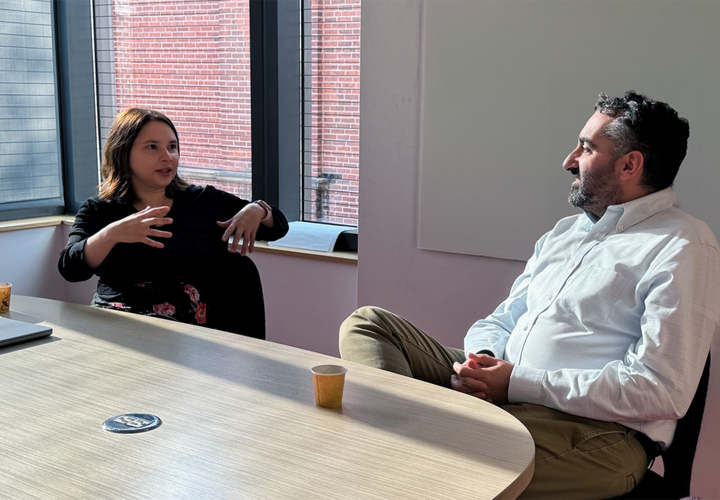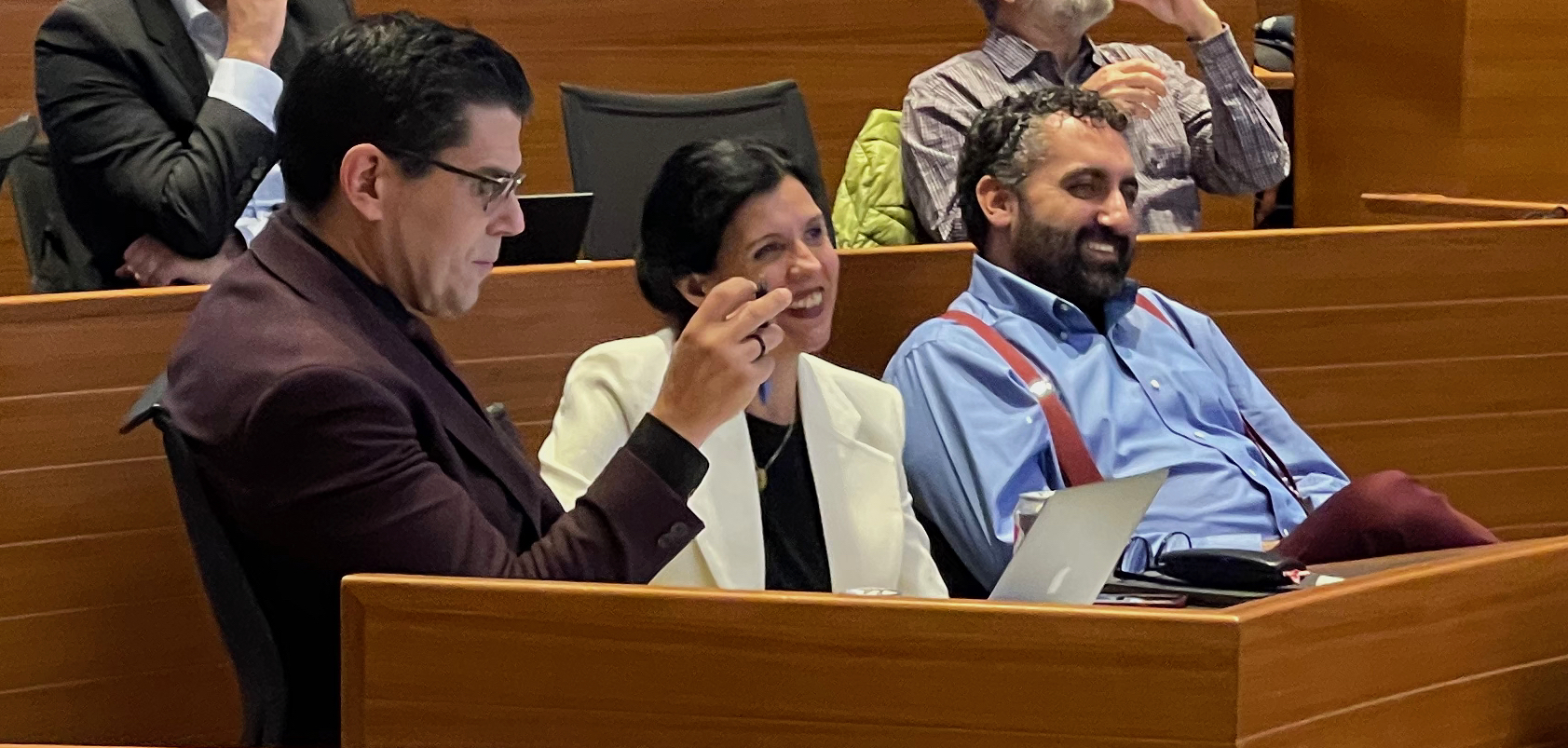In Conversation: José-Antonio Espín-Sánchez and Mayara Felix on inequality in Latin America
The two EGC affiliates discuss the persistence of inequality in Latin America and how their respective subfields – applied microeconomics and economic history – are both critical for understanding the challenge.

Latin America and the Caribbean (LAC) is one of the world’s most unequal regions. According to a recent World Bank report, over 80 percent of the region’s countries have Gini coefficients – a measure of income inequality – above 40 (out of a maximum of 100), a higher share than Sub-Saharan Africa.
Yet inequality is complex and multidimensional, so understanding its causes, consequences, and potential solutions requires multidisciplinary approaches. José-Antonio Espín-Sánchez, Associate Professor on Term of Economics, is an economic historian who studies topics like social mobility in pre-modern economies. Mayara Felix, Assistant Professor of Economics and Global Affairs, is an applied microeconomist who has studied the effects of trade liberalization on labor markets. Both are EGC affiliates and members of the Latin America and the Caribbean initiative.
In a recent interview, they discussed how their work explores the many facets of inequality in LAC and what their subfields can offer one another, with important implications for efforts to promote more inclusive development in the region.
What makes inequality such a critical issue in Latin America?
Felix: Inequality is one of the most salient topics in Latin America. A recent paper on intergenerational mobility in Brazil finds that a kid born in the bottom income quintile has only a 2.5 percent chance of rising to the top quintile, compared to 7.5 percent in the US and 16 percent in Sweden. Likewise, our colleague Orazio Attansio has shown how cognitive and other gaps in low-income children get worse and worse over the course of their lifetime. Inequality affects every realm of life, and no single policy offers a clear solution.
Espín-Sánchez: As an economic historian, I’m interested in where we are today but also where we came from. In Latin America, most of what we think we know about inequality is actually from the limited data we have after about 1900. That said, we know inequality and social mobility in Latin America are deeply tied to race, even though there has been a lot of mixing since the 16th century.
 Photograph by Vestal McIntyre
Photograph by Vestal McIntyre
Organizers of the Columbian Shock conference, Leticia Arroyo Abad (center) and José-Antonio Espín-Sánchez (R), during a Q&A.
How has your personal experience shaped your understanding of inequality?
Espín-Sánchez: I was the first in my family to go to college, so I've personally experienced what upward mobility looks like. My grandmother didn’t know how to read or write. But the history of inequality is not monolithic; if you take a long enough view, you find that there were big swings in equality, social mobility, and gender rights. Before 1800, for instance, women had more rights than they did by 1900. Today’s trends might reflect a bigger swing, but it’s part of a broader cycle.
Felix: I'm also a first-generation person, and for me, the United States was really a land of opportunity. When I was younger, I thought inequality could be fixed with redistribution. But now I understand how deep the problem is both historically and politically, with so many people benefiting from the status quo. I think our best hope is to make markets work better for the poor, in terms of creating opportunities, increasing employment, and making the economy more dynamic for lower-income populations – and my focus is on how trade and other liberalization reforms can be a means of doing that.
How does your research shed light on the persistence of inequality in Latin America?
Felix: When you grow up in a very unequal society like Brazil, it sometimes feels like a few key firms own everything. In one of my papers, I was able to put a number on this by measuring the extent to which wages get depressed by market power. I found that for every dollar a Brazilian worker generated before trade liberalization, they were paid just 50 cents – this, compared to 70 or 80 cents in the US on average – and did improve in Brazil after liberalization.
Using administrative data, I found that labor market concentration – meaning the dominance of a few employers – increased by about 10 percent in response to liberalization. Wages and employment also decreased in more liberalized sectors. But interestingly, that wasn’t due to increased firm power, it was because less-productive firms with higher prices and wages couldn’t compete after liberalization. These firms either shut down or had to cut wages. Not because they gained market power over their employees once other employers shut down, but because foreign competition put downward pressure on the prices they could charge for their products. So, negative for the directly impacted workers, but positive for consumers overall.
Espín-Sánchez: It’s important to understand that the power of elites in Latin America – the Creole elites that formed 400 years ago, when local native elites mixed with European elites – has been very persistent. This reflects network dynamics, since elites and their children often attend the same few schools and universities.
My initiative, Bridging the Atlantic, is working to collect data about these historical networks. First, we’re studying a number of Latin American countries’ 16th-century contracts with Spain and Portugal to trace how European merchants began trading goods like sugar, silver – even enslaved people, who were treated as property – which all had profound impacts on inequality and opportunity. In partnership with an online resource, we are building family trees to trace how these families fared over time. Our preliminary analysis suggests that these elite families and networks remain influential: many of the powerful families from the 16th century are still in power today.
Has your research also generated more positive insights on how inequality can be addressed?
Felix: In one paper, I examine the effects of a policy shift in Brazil in the 1990s, where firms could suddenly outsource cleaning, security, and other non-core services. In advanced economies, there’s evidence that this domestic outsourcing is bad for the workers who are directly affected by it (that is, those who are replaced by an outsourced worker), so I wanted to analyze what happened in Brazil.
I focused on security guards – partly inspired by my father, who worked as an outsourced security guard in the 1990s. In 1992, one in every 20 formally employed Brazilian men was a security guard. As in studies for advanced economies, we were able to look at what happened to guards directly affected by outsourcing (the “incumbents”). But – and this is of key importance – we were also able to look at the labor market for guards as a whole, including “new entrants” into the occupation, like my father at the time. As in advanced economies, incumbent guards were negatively affected by outsourcing events, but new entrants benefited massively from it.
On net, we found that outsourcing increased employment in the guard profession by 5 percent. Nearly half of the new employment was taken up by men coming from unemployment and informality. Youth benefited the most: security guard employment increased by 50 percent for men aged 18-24, while it decreased by 15 percent for men aged 50-64. Before the policy, firms directly hired older and more experienced guards. After, the ability to outsource allowed these firms to benefit from the economies of scale that outsourcing firms have in screening. Better screening means that direct signals of quality/reliability, such as having prior job experience, are less important. This results in a shift of the occupation’s composition towards young men. And since young men command lower wages given their inexperience, outsourcing became especially attractive for firms in need of security.
On one hand, outsourcing legalization led to a wave of layoffs for incumbent guards, who lose about 10 percent of wages permanently. On the other hand, it also led to many firms being able to afford hiring security guards, which increased security guard employment on net, especially benefitting young men and men previously unemployed or informally employed. My interpretation of these findings is that the policy had a positive impact on inequality and on opportunities for poor people, like my father.
Across my research, it’s clear that policy has a first-order effect on people’s lives, especially in big countries like Brazil, and that governments have the ability to address inequality through policy. There are good and bad ways of doing this – you want to search for policies that try to improve things for everyone, while being mindful of who will be negatively affected. Otherwise, it will backfire politically.
Mayara Felix (L) and her coauthor Michael B. Wong (R) with a security guard in Recife, Brazil, the site of their field work, September 2019.
What do you think microeconomists can learn from economic history, and what can economic historians learn from micro approaches?
Felix: We can’t understand Latin America today without understanding its history: we have centuries of coercive, extractive institutions and slavery to overcome. Democratization is relatively recent, and strongman politics prevail in many countries. Economic history is important for understanding this legacy and identifying its key details. Now that we’re able to obtain better data from historical records, the field is becoming more important than ever.
Espín-Sánchez: Economists often focus on small, well-identified questions, but it's important to connect these findings to the broader context. What does it tell us about inequality, about opportunities, about the next generation of workers? Using microdata allows us to do that: by observing individual outcomes, we can determine whether policies benefit the poor or disproportionately favor the rich, so we can have a better sense of a policy’s impact on society.